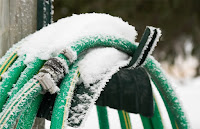6 Tasks That Smart Homeowners Do in October
The temps are starting to drop; the smell of wood smoke is in the air. Temps are more chilly than warm. That's when veteran homeowners know it's time to do these six things if they want to avoid grief or overspending: #1 Buy Appliances Do whatever it takes to get your old appliances to wait until fall to go on the fritz. Manufacturers bring out their latest models during the fall, and store owners offer big sales on appliances they want to move out — like last year's most popular dishwasher. So September, October, and November are great months to buy. But October is right in the middle — when there's still plenty of selection, and retailers might be more willing to haggle. Refrigerators are the exception since new models don't come out until spring. #2 Switch the Direction of Ceiling Fans Most have a switch to allow the ceiling fan blades to rotate either clockwise or counterclockwise — one way pushes air down to create a nice breeze and the other sucks air up, ...

